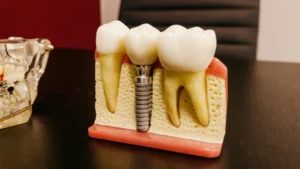What Is a Dental Implant? Everything You Need to Know
A dental implant is an artificial tooth root surgically placed into your jawbone. It’s designed to support replacement teeth, providing a durable and natural-looking solution for missing teeth. Dental implants come in different types and offer numerous benefits, such as improved appearance, speech, and oral health. In this article, you’ll discover:
- Types of dental implants
- Benefits and risks
- The implant procedure and recovery
- Costs and maintenance tips
Ready to transform your smile? Let’s get started!
Understanding Dental Implants
Dental implants are more than just a cosmetic solution. They are a revolutionary approach to restoring the function and aesthetics of your teeth. At My New Tooth, we believe that everyone deserves a confident and healthy smile.
What Are Dental Implants?
Dental implants are artificial tooth roots made from biocompatible materials like titanium. They are surgically placed into the jawbone. Once in place, they provide a stable foundation for fixed or removable replacement teeth. Unlike dentures, implants fuse with your jawbone, creating a permanent bond that mimics natural tooth roots.
How Do Dental Implants Work?
The process involves several stages:
- Initial Consultation: Your dentist will assess your oral health.
- Surgical Placement: The implant is embedded into the jawbone.
- Osseointegration: The bone grows around the implant over several months.
- Abutment and Crown Placement: Once healed, a connector and crown are attached for a natural look.
Types of Dental Implants
Endosteal Implants
Endosteal implants are the most common type. These implants are inserted directly into the jawbone. They are typically made of titanium and are shaped like small screws. They are ideal for patients with healthy jawbone density.
Key Benefits of Endosteal Implants:
- Provide a strong and stable foundation.
- Ideal for single tooth replacements or multiple teeth.
- High success rates due to bone integration.
Subperiosteal Implants
Subperiosteal implants are less common. These implants are placed under the gum but above the jawbone. They are often recommended when patients have insufficient jawbone height and do not want to undergo bone grafting.
Key Benefits of Subperiosteal Implants:
- Suitable for patients with low bone density.
- Less invasive as no bone drilling is required.
- Quicker healing time compared to endosteal implants.
Dental Implant Benefits
Improved Appearance
Dental implants look and feel like your own teeth. They are designed to fuse with bone, so they become permanent. This means you can regain a natural smile and feel more confident in social situations.
Enhanced Oral Function
Implants allow you to eat your favorite foods without worrying about pain or discomfort. They function like natural teeth, enabling you to chew and speak normally.
Long-Term Durability
With proper care, dental implants can last many years. They are resistant to decay and do not require special cleaning products. A regular oral hygiene routine is enough to keep them in great shape.
Better Oral Health
Unlike bridges, dental implants do not require the reduction of nearby teeth. This preserves the integrity of your surrounding teeth, promoting better overall oral health.
High Success Rate
Dental implants have a high success rate. Advances in dental technology and surgical techniques contribute to their reliability. So, you can trust that your investment will pay off for years to come.
The Dental Implant Procedure
Step-by-Step Process
- Initial Consultation: Your dentist evaluates your oral health and discusses your needs.
- Treatment Planning: A personalized treatment plan is created.
- Surgical Placement: The dentist places the implant into your jawbone.
- Healing Period: Osseointegration takes place over 3-6 months.
- Abutment Placement: After healing, an abutment is attached to the implant.
- Crown Placement: The final crown is placed for a natural appearance.
Post-Surgery Care
- Oral Hygiene: Maintain good oral hygiene by brushing and flossing regularly.
- Follow-Up Visits: Attend all scheduled check-ups to monitor progress.
- Diet: Stick to soft foods initially and avoid hard or sticky foods.
Are You a Candidate for Dental Implants?
Dental implants are a versatile solution, but not everyone is an ideal candidate. Several factors determine your suitability.
Oral Health Assessment
Your dentist will examine your mouth to ensure you have healthy gums and sufficient bone density. Conditions like gum disease must be addressed before the implant procedure.
Bone Density and Volume
Adequate bone density and volume are crucial for implant stability. If you lack enough bone, you may need bone grafting. This procedure rebuilds and strengthens the jawbone, making it capable of supporting an implant.
General Health Considerations
Your overall health also plays a role. Chronic conditions such as diabetes and heart disease can affect healing. Smokers may face higher risks as smoking impairs bone healing. Discuss your medical history with your dentist to ensure the best outcomes for your dental implant procedure.
Age and Lifestyle
While there’s no upper age limit, implants are not recommended for young children. Jawbones need to be fully developed. Additionally, a commitment to oral hygiene and regular dental visits is essential to ensuring the longevity and success of your dental implants.
Dental implants offer hope and a lasting solution for those with missing teeth. By assessing your eligibility and understanding the procedure and benefits, you can make an informed decision for your oral health.
Potential Risks and Complications
Dental implants offer a reliable and lasting solution for missing teeth, but, like any surgical procedure, they do come with certain risks and complications. At My New Tooth, we are committed to ensuring our patients are well-informed and prepared.
Early Risks and Complications
Immediately after the dental implant surgery, various issues can arise:
- Infection at the Implant Site: Like any surgical procedure, there is a risk of infection at the implant site. Maintaining good oral hygiene and following post-surgery care instructions can minimize this risk.
- Injury to Surrounding Structures: Although rare, the implant can sometimes injure surrounding teeth, blood vessels, or nerves. This can result in numbness, tingling, or pain.
- Implant Failure: This can happen if the implant does not properly fuse with the jawbone. Factors such as smoking and insufficient bone density can increase this risk.
Long-Term Complications
After the initial healing period, long-term complications may occur, including:
- Peri-implantitis: This is an inflammatory condition affecting the soft and hard tissues around the implant, leading to bone loss and implant failure if left untreated.
- Implant Fracture: While implants are designed to be durable, excessive force or trauma can lead to fractures.
- Sinus Problems: Particularly with upper jaw implants, a misplaced implant can protrude into the sinus cavities.
Preventive Measures
To reduce the risk of complications, consider the following:
- Regular Dental Check-Ups: Regular visits to your dentist can help monitor the health and stability of your implants.
- Quit Smoking: Smoking impairs healing and increases the risk of implant failure.
- Good Oral Hygiene: Brushing, flossing, and using antiseptic mouthwash can keep potential infections at bay.
Recovery After Dental Implant Surgery
The recovery process following dental implant surgery is crucial for successful outcomes. Understanding what to expect and how to care for your implants can ensure a smooth recovery.
Immediate Post-Surgery Care
Right after surgery, it’s essential to follow these guidelines:
- Rest and Relaxation: Allow yourself to rest for at least 24 hours post-surgery.
- Cold Compresses: Apply ice packs to reduce swelling and manage discomfort.
- Soft Diet: Stick to soft foods and avoid hot, hard, or spicy items.
Managing Discomfort
You might experience some discomfort, swelling, and bruising after the procedure. Here are ways to manage it effectively:
- Medication: Over-the-counter pain relievers or prescribed medication can help alleviate pain.
- Saltwater Rinses: Gently rinsing your mouth with saltwater can aid in keeping the surgical site clean and promote healing.
Long-Term Recovery Tips
After the initial recovery phase, focus on long-term care to ensure the success of your dental implants. This includes:
- Avoiding Hard Foods: To prevent stress on the new implants, stay away from hard or chewy foods for several months.
- Continued Dental Visits: Regular check-ups help monitor the integration of the implant and the health of surrounding tissues.
Costs of Dental Implants
Dental implants are a significant investment in your oral health. Understanding the cost structure can help you make an informed decision.
Components of Dental Implant Costs
Several factors contribute to the overall cost of a dental implant:
- Initial Consultation: Includes evaluations, X-rays, and treatment planning.
- Surgical Procedure: Fees for the surgical insertion of the implant.
- Abutment and Crown: Costs for the final abutment and customized crown.
- Additional Procedures: If necessary, costs for bone grafting or sinus lifts to ensure sufficient bone support for the implant.
Average Cost
The cost of a single dental implant typically ranges between $1,500 to $2,000 per implant. This can vary based on the complexity of the case and the region where you receive treatment.
Dental Insurance Coverage
Most dental insurance plans classify implants as cosmetic procedures, offering limited or no coverage. However, some plans may offer partial coverage for associated procedures like extractions or bone grafts. It’s essential to check with your insurance provider for specific details.
Financing Options
At My New Tooth, we offer financing options and payment plans to help you manage the cost of dental implants. Consider these options:
- Payment Plans: Spread out the cost over several months.
- Healthcare Credit Cards: Special financing offers for medical expenses.
Longevity and Maintenance of Dental Implants
Dental implants are designed to last a lifetime, but their longevity heavily depends on proper care and maintenance.
Expected Longevity
With diligent care, dental implants can last 25 years or more. Implants themselves are incredibly durable, but the crown may need replacement after 10-15 years due to wear and tear.
Maintenance Tips
Maintaining dental implants involves straightforward yet crucial practices:
- Daily Oral Hygiene: Brush twice daily and floss regularly to remove plaque and prevent infections.
- Avoid Hard Items: Don’t chew on ice or hard candies to prevent damage.
- Regular Dental Check-Ups: Routine visits to your dentist ensure any potential issues are caught early.
Professional Cleanings
Regular professional cleanings can remove hard-to-reach plaque and tartar, protecting the health of your implants. These visits also provide an opportunity for your dentist to perform a more in-depth assessment.
Dental Implants FAQs
How Painful Is the Dental Implant Procedure?
You will receive local anesthesia to numb the area, making the procedure itself pain-free. Post-surgery, you might experience some discomfort, but over-the-counter pain relievers can manage it effectively.
How Long Does a Dental Implant Last?
With proper care, dental implants can last a lifetime. The implant’s crown may need replacement every 10-15 years due to wear.
Are Dental Implants Removable?
Unlike dentures, dental implants are a permanent solution fixed into your jawbone. They are designed to mimic your natural teeth, providing stability and comfort without the hassle of removing them daily.
What If My Body Rejects the Implant?
While rare, implant rejection can occur. It typically results from an infection or improper osseointegration. In such cases, the implant might need removal and replacement after addressing underlying issues.
Can I Eat Normally with Dental Implants?
Yes, dental implants function like natural teeth, allowing you to eat normally. Initially, stick to soft foods, but once fully healed, you can enjoy a regular diet without discomfort.
What Is the Success Rate of Dental Implants?
Dental implants have a high success rate, generally around 95%. The success rate can be influenced by factors like oral hygiene, overall health, and the experience of your dental surgeon.
How Do I Clean My Dental Implants?
Cleaning dental implants involves the same practices as natural teeth. Brush twice daily, floss, and use mouthwash to eliminate plaque. Regular dental cleanings are also essential.
Can I Get an Implant If I Have Gum Disease?
Before getting a dental implant, any existing gum disease must be treated. Healthy gums are crucial for the success of the implant procedure.
Conclusion
Dental implants provide an effective and lasting solution for missing teeth. They offer numerous benefits, such as improving appearance, oral function, and overall quality of life. Understanding the procedure, potential risks, recovery, costs, and maintenance can help you decide if dental implants are the right choice for you. At My New Tooth, we’re here to guide you every step of the way.




